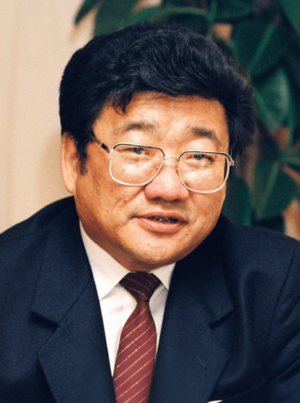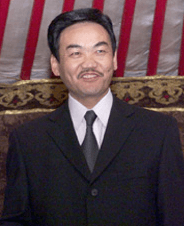Punsalmaagiin Ochirbat facts for kids
Quick facts for kids
Punsalmaagiin Ochirbat
|
|
|---|---|
|
Пунсалмаагийн Очирбат
|
|
 |
|
| 1st President of Mongolia | |
| In office 3 September 1990 – 20 June 1997 |
|
| Prime Minister | Sharavyn Gungaadorj Dashiin Byambasüren Puntsagiin Jasrai Mendsaikhany Enkhsaikhan |
| Vice President | Radnaasümbereliin Gonchigdorj |
| Preceded by | Office established |
| Succeeded by | Natsagiin Bagabandi |
| Chairman of the Presidium of the People's Great Khural | |
| In office 21 March 1990 – 3 September 1990 |
|
| Preceded by | Jambyn Batmönkh |
| Succeeded by | Office abolished Himself (as the President of Mongolia) |
| Personal details | |
| Born | 23 January 1942 Tüdevtei, Zavkhan Province, Mongolian People's Republic |
| Died | 17 January 2025 (aged 82) Ulaanbaatar, Mongolia |
| Political party | MPRP (1965–1993) |
| Spouse | Sharav Tsevelmaa |
| Alma mater | Saint Petersburg Mining Institute |
Punsalmaagiin Ochirbat (Mongolian: Пунсалмаагийн Очирбат) was an important Mongolian politician. He was the first President of Mongolia to be chosen by a direct vote from the people. He served as president from 1990 to 1997. Before that, he was the Chairman of the Presidium of the People's Great Khural in 1990. He was also a member of the Constitutional Court of Mongolia.
Contents
Early Life and Career
Punsalmaagiin Ochirbat was born on January 23, 1942, in a place called Tüdevtei, in Zavkhan Province, Mongolia. His father passed away in 1947, so he took his mother's name, "Punsalmaa."
He went to school in Ulaanbaatar, the capital city, from 1951 to 1960. After that, he studied mining engineering at the Saint Petersburg Mining Institute in Russia. He finished his studies in 1965.
Starting His Political Journey
When he returned to Ulaanbaatar in 1965, Ochirbat joined the Mongolian People's Revolutionary Party. This was a big step into his political career.
In 1967, he became the Chief Engineer at a coal mine. Later, in 1972, he was promoted to Deputy Minister of Mining and Geology. By 1976, he was a deputy in the People's Great Khural, which was like Mongolia's parliament. He also became a full Minister of Mining and Geology that same year.
In 1985, he started working on foreign economic relations. This meant he helped Mongolia work with other countries on trade and business.
Becoming President of Mongolia
In 1990, Mongolia went through a big change called the Democratic Revolution. People wanted more freedom and a different kind of government. Because of this, many government leaders resigned.
On March 21, 1990, Ochirbat was chosen to be the Chairman of the Presidium of the People's Great Khural. This made him the head of state at that time.
First Popular Election
In July 1990, new parliamentary elections were held. Ochirbat was re-elected to the People's Great Khural. Then, the members of the Khural chose him for a brand new position: President of the Mongolian People's Republic.
A new Constitution was written in 1992. This constitution changed the country's official name to just Mongolia. It also changed Ochirbat's title to "President of Mongolia and Commander-in-Chief of the Armed Forces." The new constitution also said that the next presidential election would be decided by a direct vote from the people. This was a very important change!
Leading the Country
Ochirbat believed Mongolia should quickly move away from its socialist past and become a capitalist country. He wanted to make big economic changes by the year 2000. He was known for being flexible and willing to find solutions, which helped calm difficult situations before the first free elections.
However, his own party, the Mongolian People's Revolutionary Party (MPRP), decided not to choose him as their candidate for president in 1993. Instead, they picked someone else.
A New Path to Presidency
Seeing this, a group of opposition parties, including the National Democrats and Social Democratic party, decided to support Ochirbat. They nominated him as their candidate for president.
On June 6, 1993, Ochirbat won the election with 57.8 percent of the votes. This made him the first president of Mongolia ever elected by a popular vote!
Challenges During His Term
Being president was not easy for Ochirbat. Mongolia faced many problems, like food and energy shortages, and prices going up very quickly. He often spoke out about these issues. He wanted the government to do more to help people and speed up the process of selling government-owned businesses to private owners.
In 1994, when some opposition parties left parliament, Ochirbat spoke up for their rights. He also supported changes to election laws to make sure all parties could participate fairly in elections.
Foreign Relations
Ochirbat also worked to improve Mongolia's relationships with other countries. He wanted to work with all nations, especially Mongolia's powerful neighbors, China and Russia. He declared Mongolia a nuclear-free zone, meaning no nuclear weapons would be allowed in the country.
He visited countries in South and Southeast Asia, signing agreements and getting help for Mongolia's food shortages. He was also the first Mongolian leader to officially visit the United States.

The 1997 Election
Ochirbat ran for president again in May 1997. But many people in Mongolia were unhappy with the fast changes and economic problems. There was high unemployment and many shortages.
He lost the election, winning only 29 percent of the vote. Natsagiin Bagabandi, the chairman of the MPRP, won the election.
Life After Politics
After leaving the presidency, Ochirbat continued to work for his country in different ways. He started the "Ochirbat Foundation," which was a non-profit group. This foundation focused on helping people out of poverty, promoting self-sufficiency, and supporting environmental and education programs.
In 2000, he became the Director of the Center for Ecology and Sustainable Development at the Mongolian University of Science and Technology. Later, in 2005, he was appointed as a Member of the Constitutional Court of Mongolia, and he was re-appointed in 2010.
Personal Life
Punsalmaagiin Ochirbat was married to Sharav Tsevelmaa. They had two children together.
Ochirbat passed away on January 17, 2025, at the age of 82. After his death, Mongolia's current President, Ukhnaa Khurelsukh, announced a period of national mourning.
Awards and Honors
Ochirbat received many awards and medals for his service to Mongolia. Some of these include:
- Order of Chinggis Khan
- Order of the Polar Star
- Honoured Medal of Labour
- Medals for the anniversaries of the People's Revolution
- Medal of Military Force
- Medal of the 800th Anniversary of the Great Mongolian State
- Medal of the 20th Anniversary of the Democratic Revolution
See also
 In Spanish: Punsalmaagiin Ochirbat para niños
In Spanish: Punsalmaagiin Ochirbat para niños
 | Anna J. Cooper |
 | Mary McLeod Bethune |
 | Lillie Mae Bradford |

